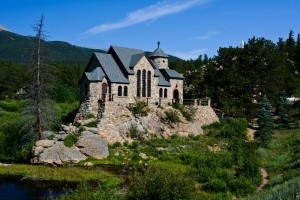
A homily on John 20: 1-18, preached on November 8, 2014 at the Charlottesville District Conference.
It’s a little strange for me to be preaching on this passage indoors, without my hiking boots. For Easter sunrise, we Wesley Foundation folks are most often found on top of Humpback Rocks, huddled together in the early light – and sometimes the snow, misty rain, or fog. It’s almost always cold. Sometimes the guitarists have to whip off their gloves at the very last minute before playing a hymn and then stuff their numb hands back in again as soon as the last chord rings out. Depending upon when Easter falls and where we are in relation to the spring time change, we have left town in our caravan of cars as early as 3am.
Maybe there are preachers who find worshipping outside to be distracting. Like my high school teachers who almost never let us hold class on the spring grass because they were afraid they’d never get our attention again, maybe there are preachers who are irritated by the competition with God’s boisterous creation. It can be hard to project on top of a mountain, with no walls to corral the sound. At Easter sunrise worship, everyone’s looking out past me, to the brightening sky to the east, behind my back. When I look out at them while preaching, I can sometimes see the rosy glow reflecting on their faces.
But here’s the thing: if we’re worried about what competes with the gospel, I think we might be worried about the wrong thing. If what I’m trying to share on Easter morning in the great glorious rest of creation singing God’s praise – if what I’m sharing at that moment can’t sing along, can’t chime in, or doesn’t hold up to the show unfurling behind me – well then maybe I’m not preaching the gospel after all.
We don’t have a better story of renewal than the resurrection at the heart of all our stories. There’s no shining that one up to something more or better or relevant or nimble or attractive to young people or authentic or actionable or radical or effective…
You know where I’m going with this one?
That Sunday morning Mary didn’t know what she’d find. She wasn’t looking for renewal or the next chapter in her story. She was heartbroken, convinced that the life-changing story she’d been living with Jesus was cut short on Friday. End of story. In the past. Done.
So she stands at the gaping maw of that tomb, weeping and wondering, newly wounded with this affront – someone has taken all that was left of Jesus. Standing at the edge of death, she hears her name.
“Mary.”
A moment ago she thought the story was over. She thought death had won. Now she hears her name and opens her eyes. She immediately wants to cling to Jesus, hold on for dear life. But, as Jan Richardson writes, “Where holding onto him might seem holy, Christ sees—and enables Mary Magdalene to see—that her path and her life lie elsewhere. Beyond this moment, beyond this garden, beyond what she has known. In going, Mary affirms that she has seen what she needed to see: not just Christ in the glory of his resurrection, but also herself, graced with the glory that he sees in her…on this day, the Magdalene we meet in the garden is simply one who has learned to see, and who goes forth to proclaim what she has seen” (“Easter Sunday: Seen” by Jan Richardson).
Right now, today, in the midst or our incessant worrying about attendance and membership and decline and money, God is speaking our names. Are we listening? Can we see? Are we ready for the path that lies elsewhere, in the direction Christ leads, out away from what we’ve come to expect and all that we want to cling to desperately?
Who knows? Maybe that call comes even through the things we’ve labeled “competition,” like soccer games on Sundays. Maybe that call can redirect our gaze from the maw of death to the rest of the story unfurling into the now and the future. Maybe we’ll see our selves and our church for the first time, if we listen.
Are we listening?
We’ve been entrusted with the best news there is – Love is strong as death, passion as fierce as the grave…Many waters cannot quench love… (Song of Solomon 8: 6-7). The end of the story is never our own failure and violence but is, always, in God’s hands. We don’t have a better story to tell because this one is enough. More than enough. This one is Life.
It starts, strange and wondrous, by getting up in the middle of the night to look death in the face. In a garden at a tomb, on a mountain in the cold, tomorrow in your own home. And then, it comes on the wind… the whisper of our names, revealing the story we long to live, the one that’s a long way from over.
Thanks be to God!
